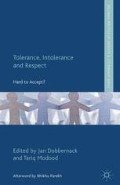Abstract
Some inherent limitations of tolerance have been considered in this volume.1 Yet it has also been argued that toleration is necessary and may even be, in challenging circumstances, a desirable solution. It is unlikely that the presence of culturally diverse populations in European countries will cease to be challenging in all sorts of ways, and we are not the first to suggest that the minimalism of toleration is infinitely more attractive than many alternatives. As a result of increasing diversity, value pluralism means that we need a way of reconciling ourselves with differences we disagree with, which may be deep and difficult to bridge. Respect for the other’s individuality, reason and human standing, or the fact of common citizenship, can provide grounds for putting disagreement into perspective and thus for tolerance. In toleration, objection is balanced by acceptance, and this balancing is not just a practical necessity in the absence of better options. The attitudes it requires are virtues that pluralist societies cannot do without.2
Access this chapter
Tax calculation will be finalised at checkout
Purchases are for personal use only
Preview
Unable to display preview. Download preview PDF.
Bibliography
Abou El Fadl, K. (2001) The Place of Tolerance in Islam. Boston Review. Available online at http://bostonreview.net/BR26.6/elfadl.html, accessed on 31 September 2011.
Abou El Fadl, K. (2003) Islam and the Challenge of Democracy. Boston Review. Available online at http://bostonreview.net/BR28.2/abou.html, accessed on 31 August 2011.
Adorno, T. W. and Horkheimer, M. (1986) Dialectic of Enlightenment, London: Verso.
Asad, T. (2003a) Formations of the Secular: Christianity, Islam, Modernity, Stanford: Stanford University Press.
Asad, T. (2003b) Islam, Secularism and the Modern State. Talal Asad Discusses His Work on Secularism and the Modern World. Asia Society. Available online at http://asiasociety.org/countries/religions-philosophies/islam- secularism-and-modern-state, accessed on 31 August 2011.
Bauman, Z. (1990) ‘Modernity and Ambivalence’, Theory, Culture & Society, 7(2): 143–169.
Besson, E. (2009) Organisation du grand débat sur l’identité nationale. Available online at http://www.bakchich.info/IMG/pdf/debat-identite-nationale. pdf, accessed on 10 September 2010.
Brown, G. (2004) The Golden Thread That Runs Through Our History. The Guardian. Available online at http://www.guardian.co.uk/politics/2004/jul/08/britishidentity.economy, accessed on 12 September 2011.
Brown, W. (2006) Regulating Aversion: Tolerance in the Age of Identity and Empire, Princeton, NJ;Woodstock: Princeton University Press.
Brubaker, R. (2012) ‘Categories of Analysis and Categories of Practice: A Note on the Study of Muslims in European Countries of Immigration’, Ethnic and Racial Studies, iFirst: 1–8.
Cameron, D. (2011) PM’s Speech at Munich Security Conference. Available online at http://www.number10.gov.uk/news/speeches-and-transcripts/2011/02/pms-speech-at-munich-security-conference-60293, accessed on 29 March 2011.
Collins, J. R. (2009) ‘Redeeming the Enlightenment: New Histories of Religious Toleration’, The Journal of Modern History, 81(3): 607–636.
Connolly, W. E. (2005) Pluralism, Durham, NC: Duke University Press.
Davison, G. (2011) ‘Testing Times: Citizenship and “National Values” in Britain and Australia’, in R. Gaita (ed.), Essays on Muslims & Multiculturalism, Melbourne: Text Publishing, 119–153.
Dürr, F. (2010) Rückblick: Die Leitkultur-Debatte in Deutschland. Arte Journal. Available online at http://www.arte.tv/de/3026040,CmC=3026780.html, accessed on 4 September 2011.
Forst, R. (2003) Toleranz im Konflikt. Geschichte, Gehalt und Gegenwart eines umstrittenen Begriffs, Frankfurt/Main: Suhrkamp.
Forst, R. (2007) ‘“To Tolerate Means to Insult”. Toleration, Recognition and Emancipation’, in B. v. d. Brink and D. Owen (eds), Recognition and Power. Axel Honneth and the Tradition of Critical Social Theory, New York: Cambridge University Press, 215–237.
Galeotti, E. (2002) Toleration as Recognition, Cambridge: Cambridge University Press.
Galston, W. A. (1995) ‘Two Concepts of Liberalism’, Ethics, 105(3): 516–534.
Gray, J. (2000) Two Faces of Liberalism, Cambridge: Polity.
Heyd, D. (2003) ‘Education to Toleration: Some Philosophical Obstacles Resolved’, in C. McKinnon and D. Castiglione (eds), The Culture of Toleration in Diverse Societies: Reasonable Tolerance, Manchester: Manchester University Press, 196–207.
Kaplan, B. J. (2007) Divided by Faith: Religious Conflict and the Practice of Toleration in Early Modern Europe, Cambridge, MA;London: Belknap.
Locke, J. (2006) An Essay Concerning Toleration: And Other Writings on Law and Politics, 1667–1683, Oxford: Clarendon.
Mahmood, S. (2005) Politics of Piety: The Islamic Revival and the Feminist Subject, Princeton: Princeton University Press.
Marcuse, H. (1969) ‘Repressive Tolerance’, in R. P. Wolff, B. Moore and H. Marcuse (eds), A Critique of Pure Tolerance, London: Cape, 95–137.
Maussen, M. and Bader, V. (eds) (2012) Tolerance and Cultural Diversity in Schools: Comparative Report. San Domenico di Fiesole: European University Institute.
Merz, F. (2000) Einwanderung und Identität. Die Welt. Available online at http://www.welt.de/print-welt/article540438/Einwanderung_und_Identitaet.html, accessed on 11 September 2011.
Modood, T. (1998) ‘Anti-Essentialism, Multiculturalism and the “Recognition” of Religious Minorities’, Journal of Political Philosophy, 6(4): 378–399.
Modood, T. (2007) Multiculturalism: A Civic Idea, Cambridge: Polity.
Moore, R. I. (1987) The Formation of a Persecuting Society: Power and Deviance in Western Europe, 950–1250, Oxford: Basil Blackwell.
Mouffe, C. (2000) The Democratic Paradox, London: Verso.
Sarkozy, N. (2009a) Discours de M. le Président de la République, Vercors. Available online at http://www.ump55.fr/index.php?option=com_content&view=article&id=189:discours-de-m-le-president-de-la-republique-la-chapelle- en-vercors-jeudi-12-novembre-2009&catid=43:actualite-nationale&Itemid= 90, accessed on 10 September 2011.
Sarkozy, N. (2009b) Respecter ceux qui arrivent, respecter ceux qui accueillent. Le Monde. Available online at http://www.lemonde.fr/idees/article/2009/12/08/m-sarkozy-respecter-ceux-qui-arrivent-respecter-ceux-qui-accueillent_1277422_3232.html#ens_id=1258775, accessed on 12 December 2011.
Taylor, C. (1994) ‘The Politics of Recognition’, in A. Gutmann (ed.), Multiculturalism and ‘The Politics of Recognition’: An Essay, Princeton, NJ: Princeton University Press, 25–73.
Tibi, B. (2001) Leitkultur als Wertekonsens. Aus Politik und Zeitgeschichte. Available online at http://www.bpb.de/publikationen/40QIUX,2,0,Leitkultur_als_Wertekonsens.html#art2, accessed on 12 September 2011.
Walsham, A. (2006) Charitable Hatred: Tolerance and Intolerance in England, 15001700, Manchester: Manchester University Press.
Walzer, M. (1997) On Toleration, New Haven;London: Yale University Press.
Žižek, S. (1997) ‘Multiculturalism or the Cultural Logic of Multinational Capitalism’, New Left Review, I(225): September-October.
Žižek, S. (2008) ‘Tolerance as an Ideological Category’, Critical Inquiry, 34(4): 660–682.
Editor information
Editors and Affiliations
Copyright information
© 2013 Jan Dobbernack and Tariq Modood
About this chapter
Cite this chapter
Dobbernack, J., Modood, T. (2013). Conclusion. In: Dobbernack, J., Modood, T. (eds) Tolerance, Intolerance and Respect. Palgrave Politics of Identity and Citizenship Series. Palgrave Macmillan, London. https://doi.org/10.1057/9780230390898_9
Download citation
DOI: https://doi.org/10.1057/9780230390898_9
Publisher Name: Palgrave Macmillan, London
Print ISBN: 978-1-349-35140-4
Online ISBN: 978-0-230-39089-8
eBook Packages: Palgrave Social Sciences CollectionSocial Sciences (R0)

